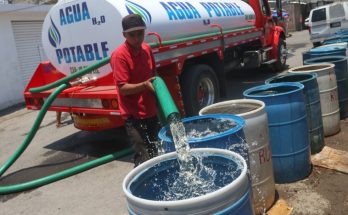By Alejandro Angulo
Last week, beekeepers from the Apicultores de Bacalar cooperative reported the death of 1,800 bee hives from 50 apiaries due to fumigation in fields of Mennonite crops. According to the beekeepers, this situation will cause economic losses estimated at 10 million pesos. The problem was the spraying of large areas of corn, sorghum, soybean, and other crops with chemicals harmful to bees or to the flora on which they feed. The method of application of the chemicals is aerial, which means they affect hives several kilometers away.
The beekeepers requested the intervention of researchers from nearby universities to find out the substances that are affecting the apiaries. Remnants of the agrochemical glyphosate were found in the areas near the hives—as well as carbofuran, imidacloprid, chlorpyrifos, and atrazine, which are all highly toxic. This situation falls under the umbrella of environmental damage.
There has been a law in the state of Querétaro since 2018: the Law for the Promotion of Beekeeping and Protection of the Pollination Process in the State of Querétaro. Part of it states that «protection of the pollination process» needs to be established. There is also a statement to the effect that whosoever causes damage, deterioration, or impairment of the ecological process of pollination of the bee populations and beekeeping property will be responsible for corrective actions, restoration, and corresponding compensation. To this is added: “In case of serious and irreversible damage to the maintenance of the evolutionary process, its viability, and continuity of the ecological process of the food trophic web and populations expressed in beekeeping and pollination in their natural environments, the solution or measure that most favors the conservation of pollination processes and pollinating agents, the production of honey, and derivatives of beekeeping activity will be chosen.”
The powers of the State Attorney for Environmental Protection are delineated as to: receive, investigate, and resolve complaints about risks, impairments, and environmental damage to honey flora, beekeeping property, pollination processes, and water bodies. Article 58 of the law establishes that whoever affects or damages hives, bees, or processes of pollination is obligated to prevent, compensate, or repair the damage they cause and assume the costs that such affectation entails. The law also takes into account damages caused by fires, destruction, or contamination due to human activity that affect apiary process. This includes the use of pesticides and other agrochemicals.
This highlights the need for a regulatory body that protects beekeepers and penalizes contamination of apiaries and flora. In the Bacalar case, all of the mentioned damages are present. There have been recent cases of massive death of bees in Campeche and throughout Mexico, and it is important that, “The general public should know that, in all the reported cases, no institution has taken responsibility for carrying out corrective and restorative measures, neither for the beekeeper nor for the ecosystems … the Federal Attorney for Environmental Protection (PROFEPA) has repeatedly indicated that it does not have the power to attend to this type of event, since bees are not considered specimens of wildlife… the Ministry of Agriculture and Rural Development (SADER), in the face of complaints, the most they have come to do is carry out the analysis of pesticide residues to determine the responsible substances…the toxic substance detected have been usually fipronil or some neonicotinoid, and these are not prohibited in Mexico; therefore, the agribusiness is not held responsible, nor is there follow-up monitoring of the pesticide in the ecosystems, nor is the government compensated. Everything is a total loss for the beekeeper.”
Responsibility cannot focus on whether or not bees are wild fauna or if certain agrochemicals are allowed. The central issue is the use of chemical substances on the pollination process especially when beekeepers were not given timely notice. There needs to be accountability for damages, and they must be repaired. Environmental damage, according to the Federal Law on Environmental Responsibility, is defined (Article 2 Section III) as “adverse and measurable loss, change, deterioration, impairment, affectation, or modification of habitats, ecosystems, elements, and natural resources, their chemical, physical, or biological conditions, the relationships interaction that occur between them, as well as the environmental services they provide.»
That includes substantial or lasting deterioration of the ecological functioning of the natural resource in question—for example, the loss for an ecosystem of ecological services provided through pollination, the destruction of species, or the loss of regeneration capacity. Said Law in Article 10 establishes that «any physical or moral person who, with his action or omission, directly or indirectly causes damage to the environment, will be responsible and will be obliged to repair the damage, or, when the repair is not possible, to the environmental compensation that proceeds. In the same way, it will be obliged to carry out the necessary actions to avoid an increase in the damage caused to the environment.”
It also gives the right to those of legitimate interest to exercise action and sue in court for environmental responsibility, repair, and compensation for damages caused to the environment. There are provisions for payment of the economic penalty as well as the benefits. Therefore, affected beekeepers have the right to file a claim for environmental damage and demand reparation under the terms of the Environmental Responsibility Law.




